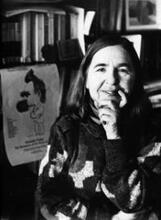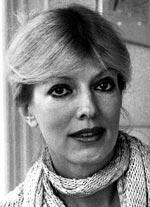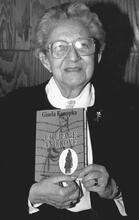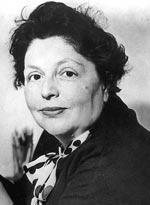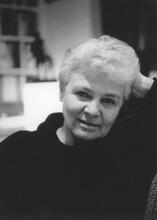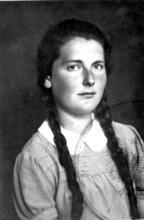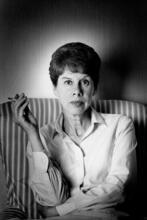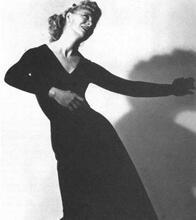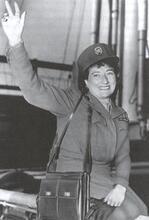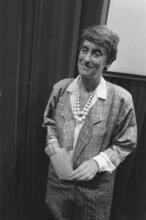Anna Maria Jokl
Born in Vienna, Anna Maria Jokl moved to Berlin in 1928, where she studied theater and film, worked as a journalist and scriptwriter, and wrote several radio plays. In 1933, her first short story was published and her experimental film premiered. Because of the rise of Nazism, Jokl fled to Prague, where she published three children’s books, including her best known, Die Perlmutterfarbe. Jokl again fled to London, then moved to Zurich to study psychoanalysis. Back in Berlin in the 1950s, Jokl worked as a therapist and created a Jewish radio program. In 1965, disappointed by the refusal of the majority of Germans to remember the Holocaust, she left Germany for Jerusalem, where she continued to work as a psychoanalyst and had a literary comeback in her eighties, with two autobiographical works.
Overview and Early Life
“Man vergisst nichts, nichts” (One forgets nothing, nothing, Essenzen, 106), says Anna Maria Jokl in her book Essenzen (1993), when, in her seventies, she looked back at her life—a life that struggles against forgetting, a life shaped by persecution, exile, and repeated new beginnings in different places: “Geographically registered, there were six lives, always at different focal points of our era: in chronological order, Vienna, Berlin, Prague, London, Berlin-Berlin, Jerusalem […]” (Essenzen, 110). The interruptions and new beginnings in Jokl’s life—due to personal and, above all, political reasons—were so significant that the metaphor of the six lives, which Jokl uses not just in Essenzen but also in some of her other works, is indeed convincing.
Jokl was born in Vienna on January 23, 1911, as the youngest of three daughters in an assimilated Jewish family. Her father, Berthold Jokl (1870–1924), was born in Mähren, Wesely (Czechoslovakia) but moved to Vienna. Her mother, Toni (née Oelsner), was born in Breslau in 1882. In 1927, after Berthold’s death, she married Siegfried Seeman, a bookseller, and moved to Berlin. In 1942, she was deported to Riga. She died in February 1943. Anna Maria’s older sisters were Eva Fanny (b. 1906) and Elisabeth (b. 1908), who married Gerardus van Velde.
Jokl’s childhood and youth were already erratic. She grew up in Vienna, where she was one of only five girls who attended a “high school for boys.” This school would later serve as the model of the school in her novel Die Perlmutterfarbe. In 1924, when Jokl was thirteen years old, her father died and left the family in serious financial difficulties. At the age of fifteen, Jokl started to work in an anthroposophical kindergarten and discovered her talent for dealing with children—an experience that may have been the basis for her later decision to become a psychoanalyst. When her mother remarried in 1927 and moved to Berlin, Jokl first stayed with her older sisters in Vienna but followed her mother one year later.
Writing and Film Career
In Berlin Jokl studied theater and film as a student of Erwin Piscator from 1929 to 1932, worked as a journalist and scriptwriter, wrote several radio plays and took her first steps in literary writing. In the spring of 1933 her short story Der Fremde (The Stranger) was published in the Vossische Zeitung. However, the political developments in Germany and the rise of the National-Socialist movement soon put an end to these promising beginnings: At the Berlin premiere of Jokl’s experimental film Tratsch in May 1933 she was not mentioned as its author. At that time, Jokl had already left Germany. Warned by Communist friends, she had escaped to Prague.
Jokl describes the years of exile in Prague as both a happy and a productive time: Besides her journalistic work, she published the theoretical study Die künstlerischen Grundlagen des Films (The artistic foundations of moviemaking) (1936) and a first children’s book, Das süße Abenteuer (1937). Only one year later, in 1938, her second novel for children and the first serious one came out: Die wirklichen Wunder des Basilius Knox, a book about physics and against capitalism. The epilogue of this book was written by Oskar Kokoschka. Another children’s book she had just finished, Die Perlmutterfarbe, which is today Jokl’s best-known book, could no longer be published: with the occupation of Prague by the German army on March 15, 1939, Jokl had to flee again. All the successes and relations that Jokl had built up in the years in Prague were again cut short by the political changes. In an unpublished fragment probably written in the 1980s or 1990s, Jokl describes these repeated disruptions in her life as follows: “This process always includes the loss, the cutting-off from roots of relationships, from the world one had warmed up around oneself. And there was again and again the task of warming up a new world. Lacking a history, because one was unknown, one constantly stepped into a new phase” (Edith, Wien, 2 [unpublished fragment]).
Jokl immigrated to Great Britain via Poland. London, which she describes as a dress that doesn’t fit but protects one from the cold, meant the interim end of Jokl’s literary career, though she was a member of the PEN Club in London. Suppressed by the strict laws in Great Britain, which did not allow enemy aliens to work, she committed herself to social projects and became interested in psychoanalysis, which she studied with Toni Sussman. In 1948 she passed the Senior Certificate examination, which enabled her to study at a university.
Psychoanalytic and Radio Career
In 1949, Jokl moved to Zurich in order to study at the Jung Institute. But the much-longed-for meeting with Jung turned out to be more than disappointing. According to Jokl, the studies were like running the gauntlet: repeatedly she was exposed to antisemitic aggression. She never received the desired diploma. Nevertheless, in the years that followed Jokl practiced as a therapist in Berlin—inter alia at the Jewish Hospital—but also worked for the radio again. From 1953 to 1955, she was the representative of the Jewish Community of Berlin in the broadcasting commission and established a Jewish program for the Sender Freies Berlin (SFB). She received considerable publicity when her translation of Zvi Kolitz’s Jossel Rackower spricht zu Gott from Yiddish to German was broadcast in 1955. Jokl, who claimed that she was totally secular, now became seriously interested in Jewish history and religion. In 1957, she started attending classes in these subjects at the Freie Universität Berlin. In 1968 Jokl published a text about her therapy of two young men—one the child of Jewish parents, the other the son of a Nazi. While in Die Perlmutterfarbe, which was finally published in 1948 and is a parable for the situation in Germany before the war, Jews or Jewishness are never mentioned explicitly, in Zwei Fälle zum Thema “Bewältigung der Vergangenheit” (Two Cases Relating to Coping with the Past) she not only takes a critical look at the past of her two patients but also at German-Jewish history. “The relationship between the murderer and the victim is one of the most intensive, and usually continues to swell until a solution is found. I am convinced that the history of the extraordinary relationship between Germans and Jews has not yet come to an end, whether one likes it or not” (Zwei Fälle, 51). In Zwei Fälle zum Thema “Bewältigung der Vergangenheit,” Jokl maintains that the younger generations of Germans are also victims of their fathers’ politics and tries to absolve the Germans from collective guilt. But already in 1965—disappointed by the refusal of the majority of Germans to remember the Holocaust—Jokl had left Germany and moved to Jerusalem.
In Jerusalem Jokl continued to work as a psychoanalyst and also started writing again. In her eighties she had a literary comeback with the autobiographical works Essenzen (1993) and Die Reise nach London (1999). The latter depicts Jokl’s impressions during a journey to rainy London in 1977—and to her own past. The sum of these impressions added up to Jokl’s biography. Essenzen is a collection of prose texts which are so condensed that almost every sentence seems to be an essence indeed. The texts tell of the different places where Jokl had been during her life. While mixing individual and collective memories and while relating to prominent persons, places, and events, Jokl creates in Essenzen a picture of her own life as well as a view of many socially important, influential and traumatic events of the twentieth century.
Jokl was a member of the Verband deutschsprachiger Schriftsteller in Israel and of the P.E.N.-Zentrum deutschsprachiger Autoren im Ausland. In 1995, she was awarded the Hans Erich Nossack-Preis for her works. At the age of ninety, on October 21, 2001, Anna Maria Jokl died in Jerusalem.
Selected Works by Anna Maria Jokl
Die künstlerischen Grundlagen des Films (1935).
Die wirklichen Wunder des Basilus Knox (1937).
Die Perlmutterfarbe (1948).
Zwei Fälle zum Thema “Bewältigung der Vergangenheit” (1968).
Essenzen (1993).
Die Reise nach London (1999).
Main sources for this entry were Anna Maria Jokl’s books, unpublished manuscripts and fragments as well as documents from her bequest (held by the Jewish National University Library, Jerusalem).
“Jokl, Anna Maria.” Österreichische Literatur im Exil seit 1933.
Haaker, Christoph. “Sie sind ein geniales Weib. ...” Zwischenwelt 17/2 (2000): 76–
87.
Hessmann, Daniela. Der Beitrag jüdischer Autorinnen zur Kinder- und
Jugendliteratur der dreißiger Jahre dargestellt am Beispiel von Anna Maria Jokl, Auguste Lazar, Ruth Rewald und Adrienne Thomas (1999).

